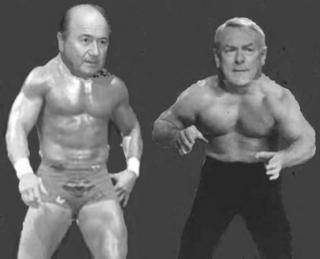
Here's a shootout in the making: two guys who can't keep away from controversy, now getting all hot under the collar at each other.
Dick Pound, head of WADA, and Sepp Blatter, head of FIFA, are having a public dispute about anti-doping policy.
The dispute itself is actually a bit puzzling:
While FIFA has modified its statutes regarding doping and … signed a declaration of intent to fully sanction WADA's code, the sticking point remains WADA's insistence that a two-year ban must be imposed on first offenders. … Blatter said, "You have to take each case on its merits, starting with a warning, to a six months punishment right up to a life ban. You cannot start from a two-year ban."
Today, AFP is reporting that FIFA has dropped the explicit mention of a six-month ban, but still wants to judge each offense on its merits; Reuters thinks that WADA won't be so easily satisfied.
All of the press reports make reference to WADA's "mandatory" two-year ban. The first Reuters article mentions a case where an Italian swimmer named Giorgia Squizzato challenged a WADA-imposed two-year ban at the CAS, with CAS ruling in her favor that the two-year punishment didn't fit her crime.
A few of those facts are wrong, though. First, the WADA code does not insist on a two-year suspension for a first offense, and it does allow for some interpretation on a case-by-case basis. You can see the WADA Code (PDF) here. If an athlete commits a violation but bears "no fault or negligence," then sanctions can be dropped entirely. If an athlete commits a violation but bears "no significant fault or negligence" then suspensions can be reduced to as little as one year.
As for the Squizzato case, you can see the actual CAS decision (PDF) here. Squizzato tested positive for a low concentration of an anabolic agent called clostebol in August, 2004. She did not dispute the test results; she explained that she was using a topical cream to fight a skin infection, and that she was not aware that it contained a banned substance. The Italian federation suspended her on September 30; on December 9, FINA (not WADA) ruled that Squizzato should serve a one-year suspension, to begin on the date of the ruling. FINA ruled that Squizzato bore "no significant fault or negligence," going easy on her because she didn't gain any advantage from the substance, and also due to her relative lack of experience.
Squizzato appealed that decision to the CAS, asking that her suspension be overturned. The CAS panel denied that appeal. They ruled in her favour only in the sense that her suspension was ruled to be effective from September 30 instead of December 9.
So FINA followed the WADA code and handed out a one-year suspension, and the CAS upheld the decision. One of the things this demonstrates is that even under the WADA code, FIFA would have some leeway to hand out suspensions that are less than two years long. I guess that they want more freedom to set penalties than are afforded by the WADA code. In that sense, the Squizzato decision does offer a little support; to quote the panel,
the mere adoption of the WADA Code … by a respective Federation does not force the conclusion that there is no other possibility for greater or less reduction a sanction than allowed by [WADA]. The mere fact that regulations of a sport federation derive from the World Anti-Doping Code does not change the nature of these rules. They are still – like before – regulations of an association which cannot (directly or indirectly) replace fundamental and general legal principles like the doctrine of proportionality a priori for every thinkable case.
At any rate, Pound has been making some aggressive comments in the media, which is nothing new, but he may have met his match this time. Not too many people have the leverage to stand up to Dick Pound, since failure to bow to WADA could result in expulsion from the Olympic Games. FIFA, though, doesn't really need the Olympics as much as the IOC needs FIFA. It will be interesting to watch this develop.


No comments:
Post a Comment